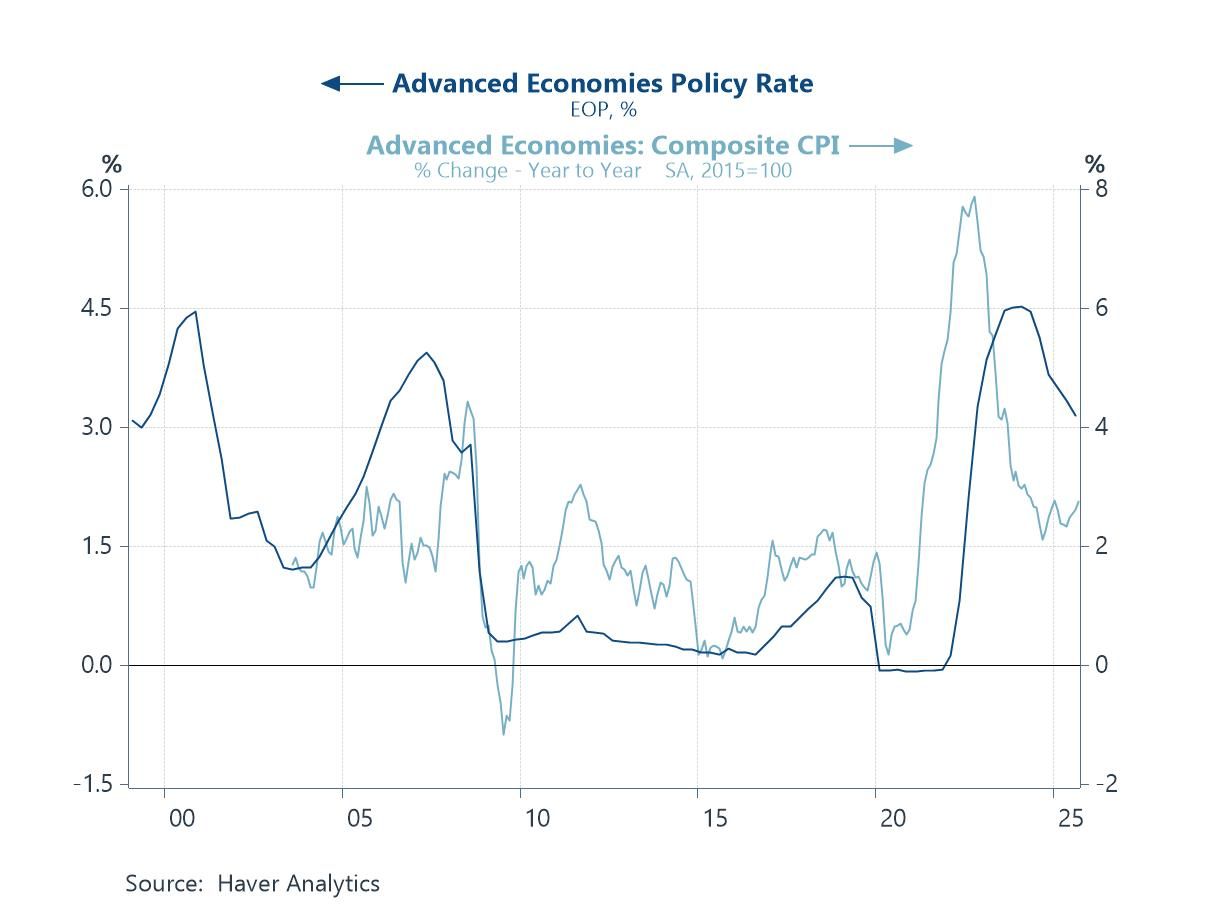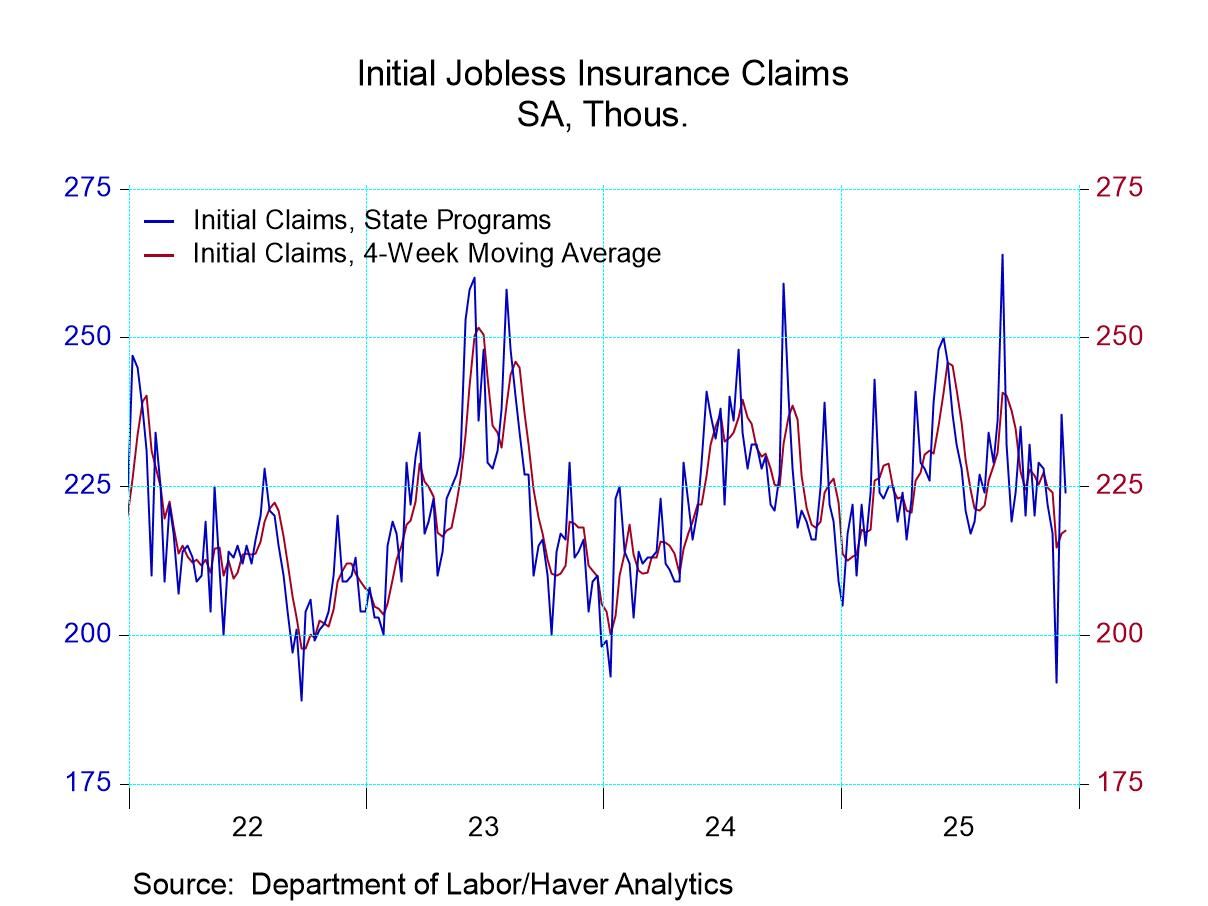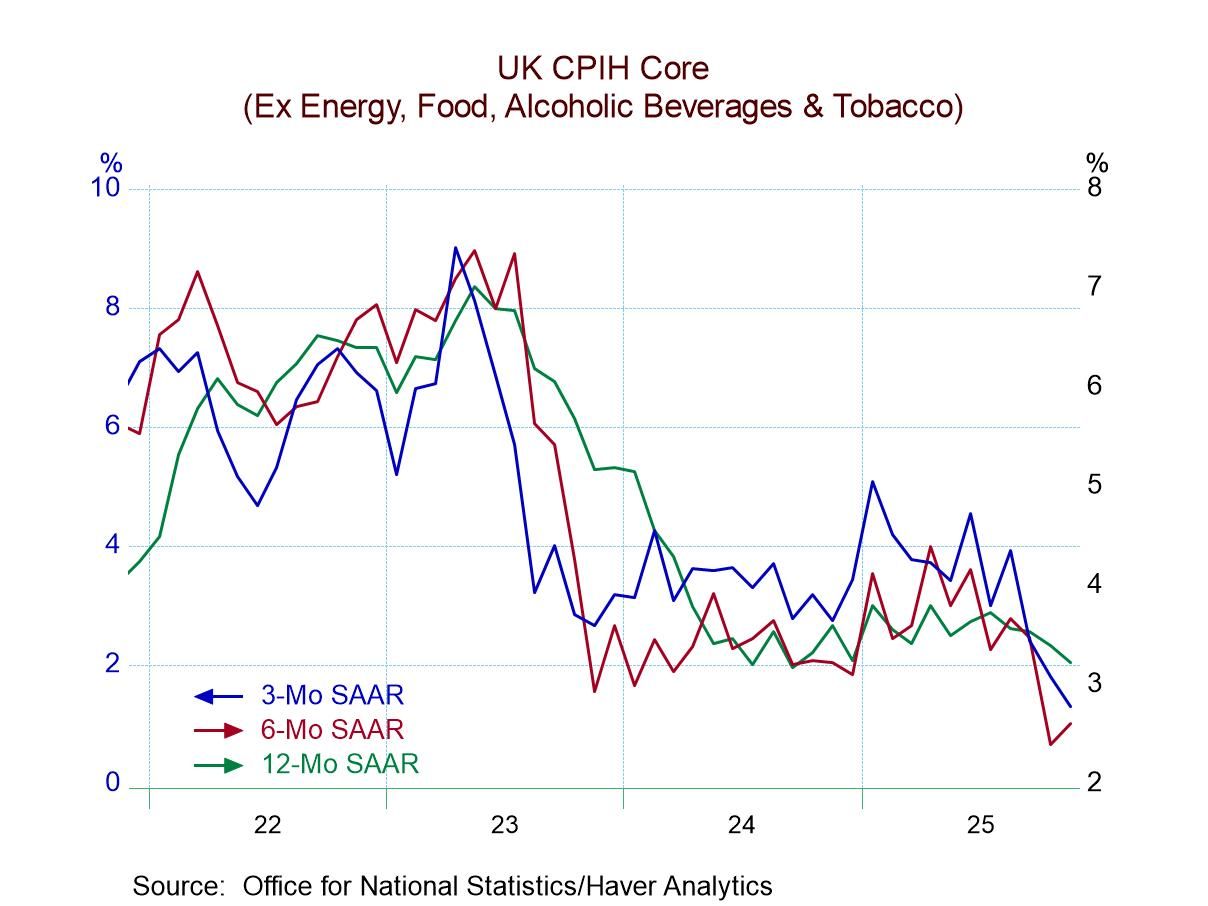 Global| Dec 03 2003
Global| Dec 03 2003ISM Non-manufacturing Index Down
by:Tom Moeller
|in:Economy in Brief
Summary
The November Business Activity Index for the non-manufacturing sector fell last month to 60.1 from 64.7 in October, reported the Institute for Supply Management. Consensus expectations had been for little change at 64.5. Since the [...]
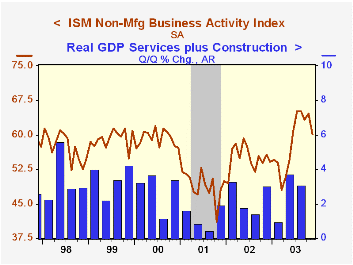
The November Business Activity Index for the non-manufacturing sector fell last month to 60.1 from 64.7 in October, reported the Institute for Supply Management. Consensus expectations had been for little change at 64.5.
Since the series' inception in 1997 there has been a 58% correlation between the level of the ISM non-manufacturing business activity index and the quarterly change in real GDP for services plus construction.
The employment index added to its strength of the prior month and rose 2.0 points to 54.9, the highest level since March 2000.
Since the series' inception in 1997 there has been an 68% correlation between the level of the ISM non-manufacturing employment index and the m/m change in payroll employment in the service producing and construction industries.
The seasonally adjusted orders index erased virtually all of the October gain and fell to 60.1.Business activity for the non-manufacturing sector is a question separate from the subgroups mentioned above. In contrast, the NAPM manufacturing sector composite index weights the components.
The seasonally adjusted prices index fell slightly to 58.0.
ISM surveys more than 370 purchasing managers in more than 62 industries including construction, law firms, hospitals, government and retailers. The non-manufacturing survey dates only to July 1997, therefore its seasonal adjustment should be viewed tentatively.
| ISM Nonmanufacturing Survey | Nov | Oct | Y/Y | 2002 | 2001 | 2000 |
|---|---|---|---|---|---|---|
| Business Activity Index | 60.1 | 64.7 | 55.7 | 55.1 | 49.0 | 59.3 |
| Prices Index | 58.0 | 58.7 | 57.5 | 53.9 | 51.6 | 63.5 |
by Tom Moeller December 3, 2003

Light vehicle sales improved 7.7% last month versus October to 16.84M. Consensus expectations had been for sales of 16.4M.
Car sales recovered 11.3% from a miserable October selling rate to 7.77M units. Sales of light trucks also rose 4.9% m/m to 9.07M.
Domestic light vehicle sales rose 7.3% m/m to a 13.50M unit selling rate (6.4% y/y).
Imported vehicle sales jumped 9.3% m/m to 3.34M (-0.3% y/y). Imports captured 19.8% of the US market for new vehicles in November.
| Light Vehicle Sales (SAAR, Mil.Units) | Nov | Oct | Y/Y | 2002 | 2001 | 2000 |
|---|---|---|---|---|---|---|
| Total | 16.84 | 15.64 | 5.0% | 16.81 | 17.26 | 17.40 |
| Autos | 7.77 | 6.98 | -1.4% | 8.07 | 8.48 | 8.83 |
| Light Trucks | 9.07 | 8.66 | 11.2% | 8.74 | 8.78 | 8.56 |
by Tom Moeller December 3, 2003
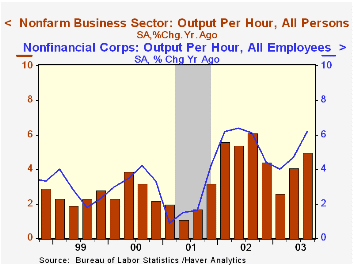
Nonfarm labor productivity growth last quarter was revised up to 9.4% from 8.1% estimated last month. Consensus expectations had been for a revision to 3Q growth to 9.0%.
The upward revision stemmed from a revision to output growth, now shown at 10.3% (4.4% y/y) versus the 8.8% estimated initially. Hours of all persons (employment times hours) was pegged at 0.8% (-0.5% y/y), little revised. Since peaking in three years ago, hours worked have fallen 5.2%.
Strong growth in recent quarters pulled the five-year growth in productivity to 3.6%, the fastest since the mid-1960s. Combined with 1.2% growth in the labor force over that period it suggests the economy's potential rate of growth is near 5.0%.
Unit labor costs are now estimated at down 5.8% in 3Q, the sharpest decline since 2Q 1983. Growth in compensation per hour was little revised at 3.0%, about the growth rate during the last two years.
Manufacturing sector productivity growth was revised up to 9.0% (4.4% y/y) from 8.6%. Unit labor costs in the factory sector fell 4.5% and were unchanged y/y.
Productivity in the nonfinancial corporate sector (derived from the income side of the NIPA) grew 9.2% (6.2% y/y). Unit labor costs fell 4.7% (-4.7% y/y).
| Nonfarm Business Sector (SAAR) | 3Q '03 (Revised) | 3Q '03 (Prelim.) | 2Q '03 | Y/Y | 2002 | 2001 | 2000 |
|---|---|---|---|---|---|---|---|
| Output per Hour | 9.4% | 8.1% | 7.0% | 5.0% | 5.4% | 1.9% | 3.0% |
| Compensation | 3.0% | 3.1% | 3.6% | 2.7% | 2.8% | 3.6% | 7.0% |
| Unit Labor Costs | -5.8% | -4.6% | -3.2% | -2.2% | -2.4% | 1.7% | 3.9% |
by Tom Moeller December 3, 2003
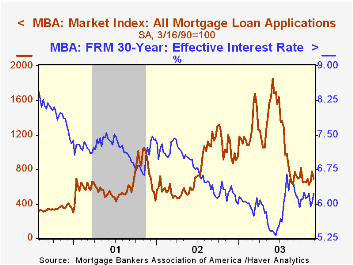
The index of mortgage applications compiled by the Mortgage Bankers Association fell 11.7% last week (-27.0% y/y) following two weeks of strong gain.
Purchase applications fell a moderate 3.9% (+14.3% y/y) from a near record height. Applications to refinance fell another 1.9% (-66.9% y/y).
During the last ten years there has been a 54% correlation between the y/y change in purchase applications and the change in new plus existing home sales.
The effective interest rate on a conventional 30-Year mortgage rose sharply w/w to 6.22%. The effective rate on a 15-year mortgage also rose to 5.60%.
The Mortgage Bankers Association surveys between 20 to 35 of the top lenders in the U.S. housing industry to derive its refinance, purchase and market indexes. The weekly survey accounts for more than 40% of all applications processed each week by mortgage lenders. Visit the Mortgage Bankers Association site here.
| MBA Mortgage Applications (3/16/90=100) | 11/28 | 11/21 | 2002 | 2001 | 2000 |
|---|---|---|---|---|---|
| Total Market Index | 685.1 | 775.6 | 799.7 | 625.6 | 322.7 |
| Purchase | 441.8 | 459.9 | 354.7 | 304.9 | 302.7 |
| Refinancing | 2,100.0 | 2,612.2 | 3,388.0 | 2,491.0 | 438.8 |
Tom Moeller
AuthorMore in Author Profile »Prior to joining Haver Analytics in 2000, Mr. Moeller worked as the Economist at Chancellor Capital Management from 1985 to 1999. There, he developed comprehensive economic forecasts and interpreted economic data for equity and fixed income portfolio managers. Also at Chancellor, Mr. Moeller worked as an equity analyst and was responsible for researching and rating companies in the economically sensitive automobile and housing industries for investment in Chancellor’s equity portfolio. Prior to joining Chancellor, Mr. Moeller was an Economist at Citibank from 1979 to 1984. He also analyzed pricing behavior in the metals industry for the Council on Wage and Price Stability in Washington, D.C. In 1999, Mr. Moeller received the award for most accurate forecast from the Forecasters' Club of New York. From 1990 to 1992 he was President of the New York Association for Business Economists. Mr. Moeller earned an M.B.A. in Finance from Fordham University, where he graduated in 1987. He holds a Bachelor of Arts in Economics from George Washington University.



